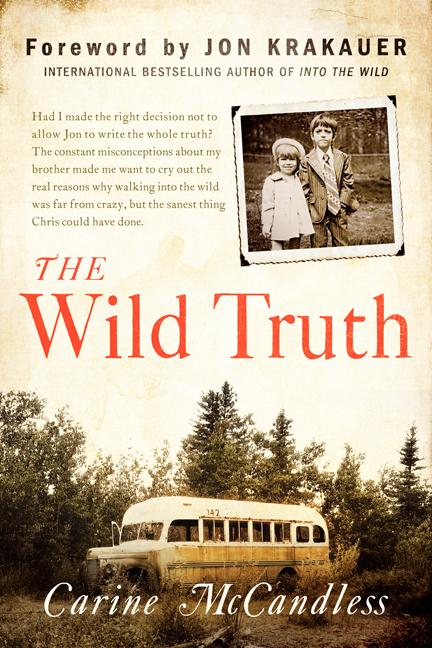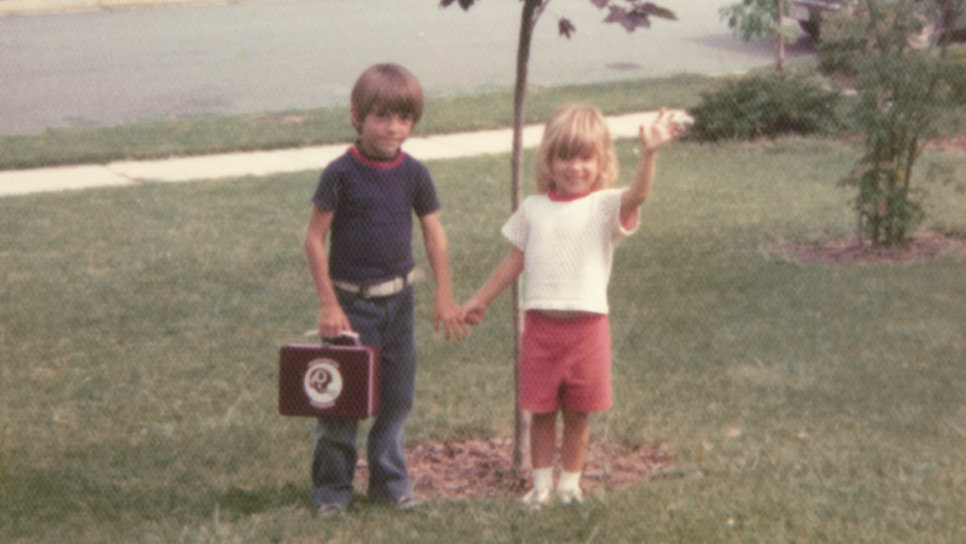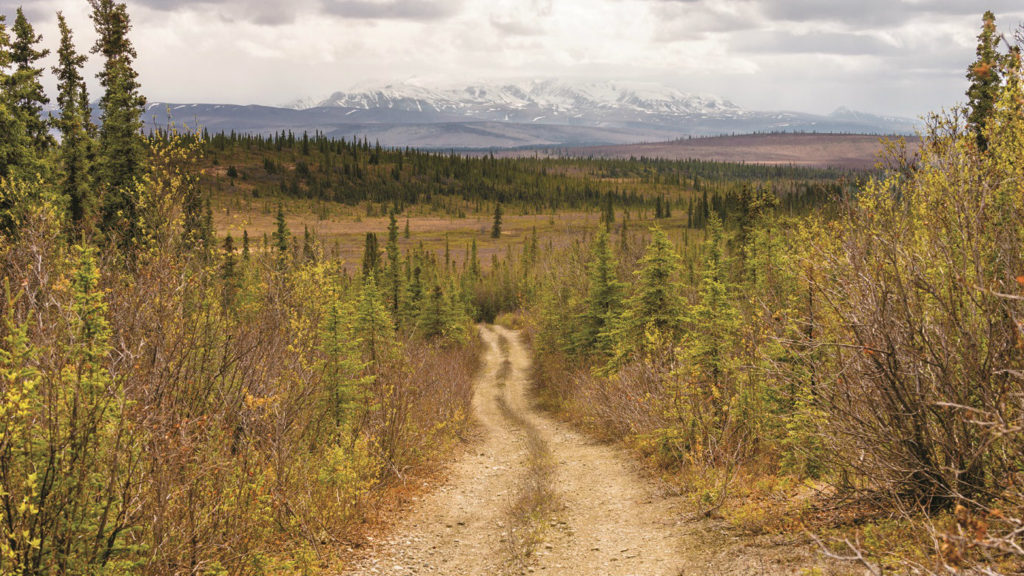Every time Carine McCandless talks about her brother, Chris, and his journey into the Alaska wilderness, she's met with surprise.
Carine McCandless, now in her 40s and the mother of two children, regularly talks with students assigned to read "Into the Wild" in class. The bestseller by Boulder's Jon Krakauer tells the story of Chris' two year odyssey around the West, which ended in 1992 in the abandoned bus where he died, apparently of starvation. It was adapted into a film released in 2007.
"I saw what an amazing effect [the book] had on [students], and I became more and more comfortable answering their questions," Carine McCandless recently told Outside Magazine. "I would always answer the students honestly... Then I would receive letters from professors, saying, 'Your visit here has changed the way I’m teaching this book.'"

That's because McCandless' account includes the violent childhood she shared with her brother and six half siblings born to their father and his first wife.
Now Carine McCandless has published her own book, called "The Wild Truth," explaining the family's history. Half-sisters Shawna Downing and Shelly McCandless contributed to the book, and Krakauer wrote the forward.
In addition to physical abuse by McCandless' parents, the book describes emotional abuse and manipulation. In one scene in "The Wild Truth," McCandless' mother calls her a liar when she tries to report a beating she took from her father.
McCandless' book also reveals the tangled history of Chris and Carine's extended family. McCandless writes in "The Wild Truth" that her father bore children with both of his wives in the same time period, and that her parents have lied publicly about the overlapping time frame.
Carine McCandless says she wanted to write "The Wild Truth" in part because reactions to "Into the Wild" have been painful for her at times. She explains in her book,
I was puzzled by the amount of attention Chris's story received, and from such a diversity of people. And as interest grew, the number of questions grew exponentially with it... Many admired Chris for his courage and felt inspired by his transcendent principles, his charitable heart, his willingness to shed material possessions and to follow what he believed was the path to a pure existence. Others considered him an idiot and admonished him for what they felt was obtuse, reckless behavior. Some simply believed that he was mentally unstable and had walked into the wilderness with no intention of ever walking back out...
With all the criticism and 'Why?' questions circulating around me, it was tough not to shout from t he rooftops the real reasons Chris had left the way he did.
In "The Wild Truth," McCandless writes that her brother left home to get away from their parents. She describes her mother's role in the drama morphing from being only a victim of their father's heavy hand to an active participant, blaming the kids for the abuse.
All this explains, McCandless writes, why her brother wanted to remove himself from the family, disappearing without telling anyone where he was going.
"The Wild Truth" includes an excerpt from a letter Chris wrote to Carine just months before he started his fatal expedition: "Once the time is right, with one abrupt, swift action I’m going to completely knock [our parents] out of my life. I’m going to divorce them as parents… I’ll be through with them once and for all forever.”

CPR News requested an interview with McCandless' parents, Walt and Billie McCandless. They didn’t respond, but they sent a written statement about their daughter's book to ABC News earlier this month. It said, in part, “[This] fictionalized writing has absolutely nothing to do with our beloved son, Chris, his journey or his character... This whole unfortunate event in Chris' life 22 years ago [meaning Chris’ journey and ultimate death] is about Chris and his dreams.”
Carine McCandless says she's not surprised by her parents' reaction to her book.
"I think their history has shown that denial would be very likely," she told Outside. "My mother has told me in the past that, because of her and my dad’s religious beliefs, the slate has been wiped clean, and that the events of our past just don’t matter anymore—they’re non-existent.
"But I believe honesty is imperative in the process of healing from family turmoil and tragedy."
Carine McCandless speaks tonight at the Boulder Book Store, and PBS is scheduled to air a new documentary about Chris McCandless' story on Tuesday, Nov. 25, called "Return to the Wild."
Read an excerpt

Reprinted from "The Wild Truth" with permission of HarperOne, an imprint of HarperCollins. Copyright (c) Carine McCandless, 2014.
During the first few months after Chris’s death, I witnessed some changes within my parents that I was confident were reconnecting us in a positive way. Though I had questioned their motivations in looking for Chris when he’d disappeared, their grief now was un- mistakably real. My mother was losing weight while my father gained. Their eyes were gaunt and tired. Whether or not they actually took responsibility for the loss of Chris, they were suffering. I was suffering, too, so I felt closer to them than ever before. At home one day I received a call from a writer who identified himself as Jon Krakauer. He was working on an article about Chris for Outside magazine, and wanted to know if I would talk to him. I was conflicted about the idea. I wanted to know what Chris’s life was like after he left Emory, where he had been, what all he had done, and here was a journalist willing to find some answers. But Chris had had a very private nature, and I feared him being exploited, which I was quick to inform Jon during our short interview. The cause of my trepidation, how- ever, I did not explain to him on the phone that day. The article Jon wrote for Outside received an extraordinary amount of attention and generated more mail to their offices than any other article in the magazine’s history. This was as much a surprise to Jon as it was to my family, which increased his already strong desire to explore Chris’s story further. The next time I heard from Jon was in May of 1993. He had just made a formal agreement with my parents to expand his efforts into a book, and asked if he could come to Virginia Beach to interview me at greater length. I was cautious. Since it was my parents who had granted him permission to tell Chris’s story, I doubted that much of the truth would be told. I was also unsure how much should be shared. I still held out hope that my parents would see the error of their ways and regret the course of events that had led to a story at all. In the end, I agreed to at least meet with Jon in person. He was not very well known, and I didn’t understand why he felt that there would be enough public interest in Chris’s life and death to write an entire book about it, much less sell many of them. I doubted that anyone beyond our own family or the occasional reader of Outside would even pick it up. Jon Krakauer flew to Virginia to interview me at the new house Fish and I had recently finished building. Upon meeting him, I was struck with an unexpected sense of trust of the kind that only comes from having years of history with someone. He seemed much like I would have expected Chris to be in his late thirties. He wasn’t particularly tall, and he had a wiry yet quite muscular build that he did not make any effort, visual or otherwise, to boast about. His hair was dark, like Chris’s, though his eyes were lighter. Overall, though, his similarities to Chris were more internal. He had an inquisitive nature that seemed to be in constant conflict with skepticism. There was not much public information on Jon to be found. I had learned only that he was a literary, journalistic-style writer and an active outdoorsman, highly respected within the obscure world of first-rate climbers. Although Jon had a reserved demeanor, I could almost see the current of fervent energy flowing behind his eyes. The mystery surrounding my brother’s story was one that seemed to intrigue him to a point of obsession, but in a very private way. He never asked me directly, but I could discern from Jon’s questions that he believed there was much more to Chris’s story than he had previously been told. He wanted to know about our family dynamics from my perspective. I recognized his intense quest for truth. At first, I spoke vaguely around the issues he was attempting to dissect, but this strategy did not last long. Not because I was unable to speak in soft circles around the specifics of our childhood—I had been doing that for years—but because, for the first time, I felt obligated to tell the truth. I had kept so much private, and even the notion of coming clean about our family history offered me a sense of relief. I trusted that Jon wanted honest answers for the right reasons. I told him about Walt’s coinciding “marriages.” I told him about the awful fights, the manipulations, the violence. As I treaded into the unexplored territory of exposing the reality of our past, I became more and more comfortable with Jon. Resolute, I explained that truth was of paramount importance to Chris—and why that was. In Chris’s own words, there was “nothing more crucial to a pure and happy existence.” I wanted to honor and do justice to Chris, and I felt I could only do that by describing everything in the most finite detail, telling Jon the whole story so he could represent Chris fully, even if not explicitly. Jon was grateful to my parents for allowing him to delve into the mystery of Chris’s journey, and he was also sensitive to their pain. But I perceived an even stronger obligation within him to understand Chris and be fair to him. He was clearly not party to what I feared might be my parents’ agenda. While I told him almost everything, I asked that he keep much of it private. I still wanted to protect my parents from full exposure in case they could change for the better. I wanted to spare my siblings from having to deal with the painful mess of our family history in a public way. We spoke about the delicate line we would need to de- fine and walk together. He would quote me describing my relation- ship with my parents as “extremely good,” and at the time, I hadn’t stopped believing that it could be. Just as Jon was preparing to head back to the airport, I felt an overwhelming reassurance come over me. I decided to let him read Chris’s letters, which I had never shared with anyone else—not my parents, not Fish, not my closest friend, not even my siblings. I would not let Jon make copies or take any photographs of the letters. He was restricted to handwritten notes only. Shortly after reading the first letter, the others spread out on the table awaiting their turn to speak for Chris, Jon’s mood became anxious. His eyes darted across Chris’s impassioned handwriting, then back to his notepad. I knew he would need time to digest what he was reading and that there would be hours of discussion ahead. I invited him to have dinner with Fish and me and stay in the guest room for the night. His acceptance was understood as he quickly rescheduled his flight and informed his wife, Linda, of the change in plans. Before handing over the letters, I made Jon promise that he could not include anything from them in his book without my approval, and even as I said the words, I felt that they had been unnecessary. I sensed a deep respect from him and that he was very aware that having my trust was his key to truly understanding what had made Chris tick. I had given the author of the story Chris did not live to tell the enormous responsibility of knowing the truth yet not writing it. |








